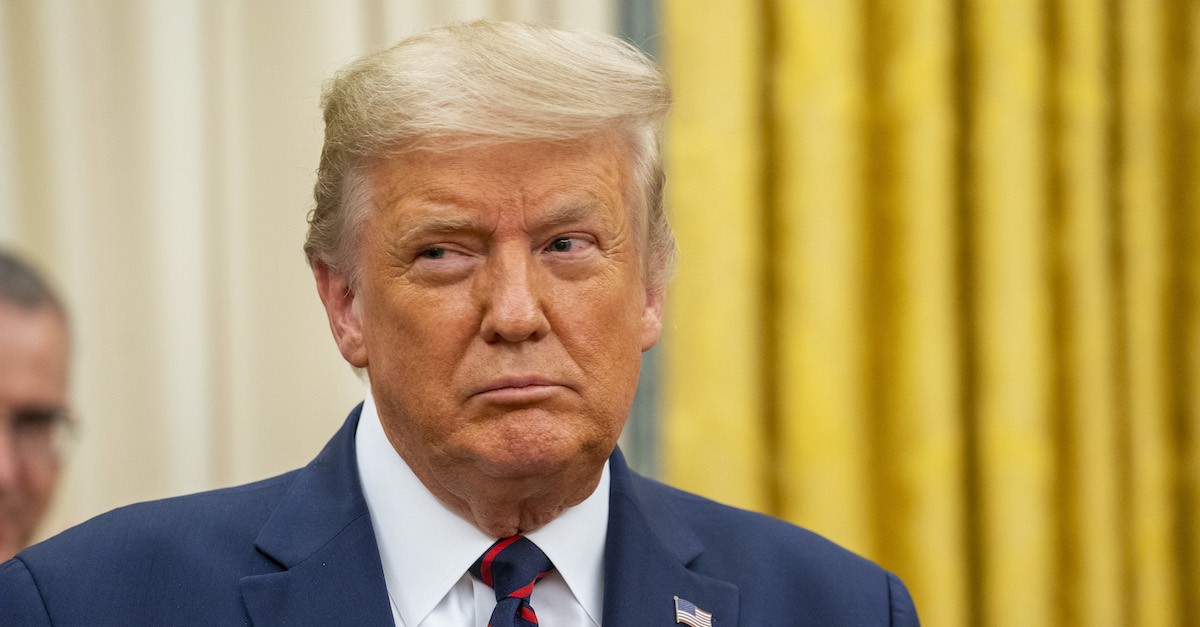
As I’ve written before with respect to President Trump, there are some problems with invoking the 25th Amendment. For now, I’ll focus on impeachment. Many have suggested that Congress should undertake impeachment immediately.
Impeach him so he cannot run again. I literally never want to hear his fucking name again https://t.co/vYGjPyxZTv
— ⚖️Imani Gandy ⚖️ (@AngryBlackLady) January 7, 2021
Even Former Attorney General William Barr denounced the president’s conduct, though he stopped short of using the I-word:
Trump’s term as president ends in less than two weeks. Certainly, Congress could impeach (and possibly even convict) Trump before Joe Biden is sworn in on January 20, 2021. Such action, however, would require an alacrity for which Congress isn’t generally known.
Could Trump be impeached even after he leaves office? If so, would a conviction prevent him from holding office in the future?
The inquiry isn’t one without relevant history — and is of course one ripe for lengthy debate.
William Belknap, the war secretary to President Ulysses Grant, was impeached after he’d already resigned. The House of Representatives investigated Belknap for corruption, and found him to have regularly received illegal kickbacks. Articles of Impeachment were drafted, and on March 2, 1876, just minutes before the House of Representatives was scheduled to vote on them, Belknap tearfully resigned.
The House still voted to send the Articles of Impeachment to the Senate. The Senate, having determined that it retained jurisdiction over former government officials, held a full trial in the following months. House managers argued at the time that Belknap should not be allowed to escape justice by simply resigning. Ultimately, a majority of the Senate voted to convict Belknap on all articles; the vote failed to reach the two-thirds supermajority required for conviction, though, and Belknap was acquitted.
The history here might be of special interest to Senator Ted Cruz (R-Texas), who passionately urged the Senate to turn the clocks back to 1876 just moments before throngs of would-be MAGAlutionaries started scaling the walls of the Capitol building.
University of Minnesota law professor Richard Painter, the former chief White House ethics lawyer under George W. Bush, believes a former president could be impeached based on the Belknap precedent.
Others, though, do not agree. Law&Crime spoke with Tulane Law professor and impeachment expert Ross Garber, who said, “Impeachment could only happen while Trump is in office, not after he leaves.”
On its face, Article II, Section 4 of the U.S. Constitution does not appear to allow for impeachment of former federal officials. It reads:
The President, Vice President and all civil Officers of the United States, shall be removed from Office on Impeachment for, and Conviction of, Treason, Bribery, or other high Crimes and Misdemeanors.
Certainly, an argument could be made that Belknap’s post-resignation impeachment did not carve out a broader precedent. The gears of the Belknap impeachment, after all, had already been turning at the time of his resignation. That is quite a different thing than initiating impeachment proceedings after Trump (hopefully) vacates the Oval Office.
Of course, Congress could mirror the Belknap impeachment by adopting articles before January 20, 2021 and following up with trial thereafter. That raises the next question.
If Trump were to be impeached, would it prevent him from holding office in the future?
Some have suggested that impeachment is a worthwhile endeavor even if it has little practical effect with regard to Trump himself.
Theoretically, Trump could run for office again in the future; if the events in D.C. on Wednesday proved anything, it’s that many Americans will continue to support Trump regardless. Therefore, a kind of proactive impeachment might well have merit.
However, whether conviction on impeachment charges would actually prevent Trump from holding future office remains something of an open question.
Article II, section 4 provides for the immediate consequences of a federal official’s impeachment: that those convicted “shall be removed from office.” For this point, there is broad agreement; a president or other official who is convicted on impeachment charges must be removed from office.
Article I, section 3, clause 7 give additional guidance: “judgment in cases of impeachment shall not extend further than to removal from office, and disqualification to hold and enjoy any office of honor, trust or profit under the United States.”
This is a limitation on the penalties for impeachment, primarily understood as a way of emphasizing the non-penal nature of the impeachment process. Impeachment is not a criminal matter, but a civil affair. The plain language, as well as the history of this disqualification clause supports the interpretation that disqualification from future office is discretionary, as opposed to automatic.
Ross Garber explained that the disqualification provision of the impeachment language might not prevent a president who has been impeached and removed from being elected president (or to Congress) in the future. “That clause is limited to precluding an official from holding ‘any office of honor, trust or profit under the United States’,” Garber said. “The text of other provisions of the Constitution suggests this does not include the presidency or a seat in the House or Senate.”
Indeed, legal scholars have often recognized the inconsistency in language within the Constitution when referring to various federal offices. For a detailed discussion about these inconsistencies, see here.
Bottom line: even if Trump were to be impeached and convicted, there would be debate about which, if any, federal offices he might be legally able to hold in the future. Further, thanks to federalism, none of this would have the legal function of preventing Trump from holding state level office in the future.
[Image via Doug Mills/Pool/Getty Images]